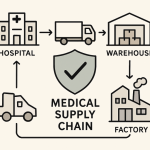The construction industry has long been known for hard hats, blueprints, and heavy machinery. But there’s another transformation taking place, one that’s less visible but equally powerful. From job sites across the globe, construction companies are making a decisive shift from paper-based ledgers and desktop software to cloud-based digital bookkeeping systems.
This isn’t just a trend it’s a fundamental reshaping of how the industry manages its finances.
The Numbers Tell the Story
The shift toward digital bookkeeping is backed by compelling market data. The construction bookkeeping and accounting software market is growing from $1.64 billion in 2024 to $1.72 billion in 2025, with projections hitting $2.26 billion by 2029. This rapid expansion reflects a clear reality: construction businesses that embrace digital bookkeeping are gaining a competitive edge.
The broader cloud accounting market paints an even more striking picture. The cloud accounting software market is projected to grow from $26.78 billion in 2025 to $77.29 billion by 2034, exhibiting a compound annual growth rate of 12.83%.
Construction companies are no longer asking if they should go digital they’re asking how quickly they can make the transition.
Why Construction Can’t Afford to Stay Manual
Despite these trends, many construction firms still cling to outdated methods. Gartner estimates that 45% of construction organisations use manual methods, putting them at a significant disadvantage in an increasingly competitive market.
The construction industry faces unique financial challenges that make digital bookkeeping essential:
Job costing complexity – Unlike traditional businesses, construction companies must track costs across multiple simultaneous projects, each with its own budget, materials, subcontractors, and timelines. Manual systems simply can’t keep pace with this complexity.
Cash flow management – Construction projects involve progress billing, retention and payment delays that can wreak havoc on cash flow. Digital systems provide real-time visibility into receivables and payables, helping firms avoid costly cash crunches.
Mobile workforce – Construction professionals work across multiple job sites, often in remote locations. Cloud-based bookkeeping allows project managers, estimators, and executives to access financial data from anywhere, on any device.
Regulatory compliance – From prevailing wage requirements to lien waivers and certified payroll, construction accounting involves extensive compliance obligations. Digital systems automate documentation and reduce the risk of costly errors or penalties.
The Real-World Benefits
The advantages of digital bookkeeping extend far beyond convenience. Cloud applications deliver 4.01 times the ROI compared to on-premises solutions, driven by lower upfront costs, reduced maintenance expenses, and scalability.
67% of accountants believe that real-time accounting data improves decision-making and provides a competitive advantage. For construction companies managing tight margins and complex projects, this real-time visibility can mean the difference between profit and loss.
Consider the operational improvements: Businesses using QuickBooks invoice reminders get paid up to 5 days faster on average and as much as 4 times faster when offering online payments instead of paper invoices. In an industry where cash flow is critical, faster payments directly impact a company’s ability to pay subcontractors, order materials, and take on new projects.
Digital bookkeeping also enhances collaboration. 73% of finance leaders believe that cloud technology improves collaboration across the finance function.
When accountants, project managers, and executives can all access the same real-time data, communication improves and costly misunderstandings decrease.
The Adoption Curve
Construction firms worldwide are recognising these benefits. In the United Kingdom, 62% of construction enterprises reported purchasing cloud computing services over the Internet in 2020, a notable increase from 44% in 2018 and 30% in 2016. This acceleration isn’t limited to one region it’s a global movement.
The COVID-19 pandemic accelerated this shift dramatically, forcing companies to enable remote access to financial data overnight. Many discovered that cloud-based systems not only solved their immediate crisis but actually improved their operations long-term.
Looking Ahead: The Future Is Integrated
The evolution doesn’t stop at basic cloud accounting. Digital transformation in construction bookkeeping entails employing advanced software and technologies like artificial intelligence, machine learning, and automation to streamline financial operations.
Tomorrow’s construction accounting systems will feature:
- AI-powered insights that predict cash flow problems before they occur
- Automated invoice processing that eliminates data entry and catches errors
- Integration with project management tools creating a single source of truth across operations
- Real-time dashboards that give executives instant visibility into project profitability
- Mobile apps that allow field teams to submit expenses and timesheets on the spot
Construction experts predict that data-led approaches to project delivery will become more widespread in 2025, with the emergence of “ConTech 3.0” where businesses of all sizes deploy data strategies similar to those traditionally seen in sectors like finance.
The Bottom Line
The world is moving toward digital bookkeeping and construction companies that resist this shift do so at their own peril. With advantages such as increased data accuracy, improved efficiency, boosted productivity, real-time reporting, and heightened security, companies are increasingly embracing the digital shift.
For construction firms still relying on spreadsheets, desktop software, or paper records, the message is clear: digital bookkeeping isn’t just about keeping up with technology it’s about staying competitive, protecting cash flow, and positioning your business for growth in an increasingly digital industry.
The question isn’t whether to make the transition to cloud-based bookkeeping.
The question is whether you can afford to wait any longer.
So when is the right time to digitise construction bookkeeping? Id say right now
Lynn Martelli is an editor at Readability. She received her MFA in Creative Writing from Antioch University and has worked as an editor for over 10 years. Lynn has edited a wide variety of books, including fiction, non-fiction, memoirs, and more. In her free time, Lynn enjoys reading, writing, and spending time with her family and friends.















